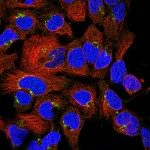Lien vers Pubmed [PMID] – 16443748
J. Cell. Sci. 2006 Feb;119(Pt 3):433-42
Inherited prion diseases are neurodegenerative pathologies related to genetic mutations in the prion protein (PrP) gene, which favour the conversion of PrP(C) into a conformationally altered pathogenic form, PrP(Sc). The molecular basis of PrP(C)/PrP(Sc) conversion, the intracellular compartment where it occurs and how this process leads to neurological dysfunction are not yet known. We have studied the intracellular synthesis, degradation and localization of a PrP mutant associated with a genetic form of Creutzfeldt-Jakob disease (CJD), PrPT182A, in transfected FRT cells. PrPT182A is retained in the endoplasmic reticulum (ER), is mainly associated with detergent-resistant microdomains (DRMs) and is partially resistant to proteinase K digestion. Although an untranslocated form of this mutant is polyubiquitylated and undergoes ER-associated degradation, the proteasome is not responsible for the degradation of its misfolded form, suggesting that it does not have a role in the pathogenesis of inherited diseases. On the contrary, impairment of PrPT182A association with DRMs by cholesterol depletion leads to its accumulation in the ER and substantially increases its misfolding. These data support the previous hypothesis that DRMs are important for the correct folding of PrP and suggest that they might have a protective role in pathological scrapie-like conversion of PrP mutants.

